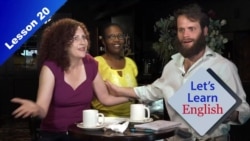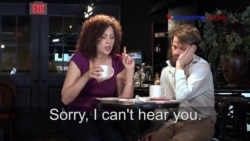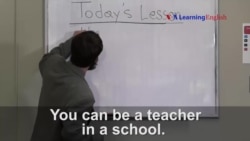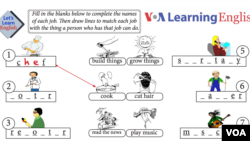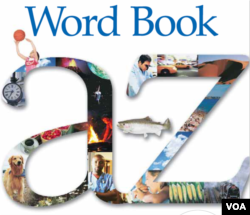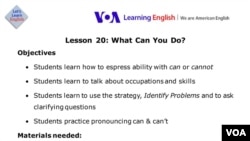Let's Learn English (ມາຮຽນອັງກິດນຳກັນ) ເປັນບົດຮຽນແນວໃໝ່ ສຳລັບຜູ້ຢາກຮຽນພາສາອັງກິດ. ພວກນາຍຄູສອນພາສາອັງກິດແບບອາເມຣິກັນ ໄດ້ອອກແບບບົດຮຽນນີ້ ສຳລັບພວກທີ່ເລີ້ມຕົ້ນໃໝ່. ບົດຮຽນຈະດຳເນີນໄປເລື້ອຍໆເປັນເວລາ 52 ອາທິດ.
ໃນແຕ່ລະອາທິດ ຈະມີບົດຮຽນໃໝ່ ພ້ອມດ້ວຍວີດີໂອ ສະແດງໃຫ້ເຫັນ ຊີວິດຂອງພວກຊາວໜຸ່ມອາເມຣິກັນ. ບົດຮຽນດັ່ງກ່າວ ແມ່ນຮວມທັງຄຳແນະນຳ ໃນການເວົ້າ, ຄຳສັບ ແລະການຂຽນ.
ນອກນັ້ນ ຍັງມີບົດຝຶກຫັດທີ່ພິມໄດ້, ການຊັ່ງຊາ ແລະການວາງແຜນຮຽນສຳລັບສ່ວນບຸກ ຄົນ ແລະນາຍຄູສອນອັງກິດ. ພວກເຮົາຢາກຊຸກຍູ້ໃຫ້ທ່ານຕິດຕາມບົດຮຽນປະຈຳ ອາທິດ ແລະໂອ້ລົມກ່ຽວກັບຄວາມກ້າວໜ້າຂອງທ່ານກັບພວກເຮົາ ໂດຍຜ່ານທາງບົດຄວາມເຫັນແລະໂດຍທາງອີແມລ.
ໃຈຄວາມ (Summary)
Anna meets her friend Pete in a coffee shop. Pete needs a job. Can Anna help him to find the right job for him?
Anna ພົບກັບໝູ່ຂອງລາວ Pete ຢູ່ຮ້ານກາເຟແຫ່ງນຶ່ງ. Pete ຕ້ອງການວຽເຮັດ. Anna ຈະສາມາດຊ່ວຍລາວ ຫາວຽກທີ່ເໝາະສົມກັບລາວໄດ້ບໍ?
ເວົ້າ (Speaking)
In this video, you can practice saying the new words and learn how to ask questions when you do not understand someone clearly.
ອອກສຽງ (Pronunciation)
This video teaches about the shortened form of cannot and the two ways to pronounce can.
ສົນທະນາ (Conversation)
Anna: Hi, there! Washington, D.C. is a great place to work. Many people here work in government and politics. But there are many other jobs. You can work at a hospital; a university. You can work in a coffee shop. Wait a minute, I think I see a friend of mine. Pete? Is that you?
ຂຽນ (Writing)
In this lesson, Anna is helping her friend Pete. He needs to find a new job. How do you try to help your friends? Write to us to tell us about the ways you help your friends. Send us an email or write in the Comments section.
Use the Activity Sheet to practice talking about jobs and skills.
ຍຸດທະສາດການຮຽນ (Learning Strategy)
Learning Strategies are the thoughts and actions that help make learning easier or more effective.
The learning strategy for this lesson is identify problems. When we are talking with someone in English it helps to identify problems in understanding and get the information we need to correct the problems.
In the video for this lesson, there are three problems. Here are two of them.
1. Anna identifies one problem. Pete is not talking loud enough. She tells Pete. "Sorry, I can’t hear you." Pete speaks more loudly so she can hear him.
2. Later, Pete does not understand Anna. He asks, "Do you mean drive a race car?" Anna explains that she means to "drive a taxi or drive a bus."
Can you find another time in the video when Anna or Pete identifies a problem? Write to us in the Comments section or send us an email. Teachers, see the Lesson Plan for more details on teaching this strategy.
ສອບຟັງ (Listening Quiz)
______________________________________________________________
ຄຳສັບໃໝ່ (New Words)
______________________________________________________________
ອຸບປະກອນການຮຽນຟຣີ (Free Materials)
Download the VOA Learning English Word Book for a dictionary of the words we use on this website.
Each Let's Learn English lesson has an Activity Sheet for extra practice on your own or in the classroom. In this lesson, you can use it to practice writing ordinal numbers.
ສຳລັບນາຍຄູ (For Teachers)
See the Lesson Plan for this lesson for ideas and more teaching resources. Send us an email if you have comments on this course or questions.
Grammar focus: Expressing ability; Can & Can't; Contractions
Topics: Occupations and skills; Helping friends
Learning Strategy: Identify Problems
Speaking & Pronunciation Focus: Asking clarification questions; Pronouncing can & can’t
______________________________________________________________
Now it's your turn. Send us an email or write to us in the Comments section below or on our Facebook page to let us know what you think of this lesson.
Special request to teachers and English learners:
As we show in the Lesson 19 video, Anna is going to have a new children's program. What should she call the program? Let us know in the Comments section or by email. We'll send a special thank you to the person who suggests the best name.




